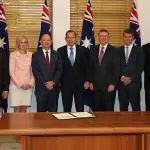
The drafters of our Commonwealth Constitution wanted a federal system of government where law-making powers were shared between the Commonwealth and State Parliaments. They went to considerable lengths to strike a balance between the national government having sole authority to make laws in some areas (exclusive powers) – as well as areas where it might share law-making power with the States (concurrent powers). The constitutional drafters also decided that powers not specifically given to the Commonwealth would remain with the States (residual powers). The balance of State-Federal powers is a significant but often misunderstood aspect of Australian federalism.
Federalism has been both a balancing act and a battleground between Federal and State governments. Both levels of government are prone to blaming each other for problems and policy failures in areas like healthcare and education, particularly when the governments are of different parties. The Commonwealth government occasionally threatens to ‘take over’ responsibility for administration and law-making in a particular area from the States. In 2008 the then prime minister, Kevin Rudd, suggested the Federal government might assume control of the healthcare and hospital systems, if the States could not correct problems like extensive waiting lists.
The division of power between Federal and State governments can and sometimes does change. Altering the Constitution is perhaps the obvious means of altering this division, though it is notoriously difficult to achieve. Another way the Commonwealth can increase its law-making power at the expense of the States is through the Constitution’s referral of power clause. Section 51(xxxvii) of the Constitution allows the States, individually or collectively, to voluntarily hand over their responsibilities and law-making powers to the Commonwealth. This is known as the ‘referral power’. Some examples of the referral power in action include:
Railways. In 1975 the Commonwealth government, then led by prime minister Gough Whitlam, formed the Australian National Railways Commission (ANRC). Whitlam invited the States to hand over both their constitutional responsibility for railways and their railway infrastructure, to allow the ANRC to become a national rail network. South Australia and Tasmania, whose railway systems were losing money, readily agreed. The four other States, however, preferred to retain ownership of their networks. As a consequence, Whitlam’s dream of an Australian rail system was never achieved.
Corporations. In 1989 the Commonwealth attempted to legislate to regulate the formation and registration of new corporations. A High Court ruling later determined that this power belonged to the States, and that the Commonwealth had no authority to pass laws in this area. In order to develop nationwide consistency and uniform standards, the States later agreed to refer their power to regulate corporations to the Commonwealth. Canberra later passed the Corporations Act (2001) which utilised these referred powers.
Marriage. Section 51(xxi) of the Constitution gives the Commonwealth law-making power over marriage and the children of married couples – but not de facto couples or their children. This created problems when the Family Court began operation in 1976, as the court found it could only deal with separations and custody disputes between legally married couples. In the late 1980s, most of the States referred responsibility for de facto couples and ex-nuptial children (children born outside marriage) to the Commonwealth. Responsibility for these couples and children are now administered by the Family Court.
Terrorism. In 2002 the Commonwealth sought to pass legislation dealing with the punishment of terrorists and those who support or plan terrorist acts. Since most of the relevant offences were actually part of State criminal codes, the Commonwealth sought and obtained a limited referral of powers from the States. This allowed the passage of a Commonwealth act dealing with terrorism at a national level rather than a State level.
As one might expect, the States are often reluctant to surrender their law-making powers. When they do it is usually because the Commonwealth government has either exerted pressure or offered inducements to the States in question. One way it does this is through manipulation of Commonwealth grants. Section 96 of the Constitution says that the Commonwealth can grant financial assistance to the States “on such terms and conditions as the parliament thinks fit”. Since Federation, the States have come to rely on Commonwealth grants. Knowing this, the Commonwealth often uses Section 96 to place conditions on these grants – such as the referral of certain law-making powers.
© lawgovpol.com 2014. Content on this page may not be republished or distributed without permission. For more information please refer to our Terms of Use.
